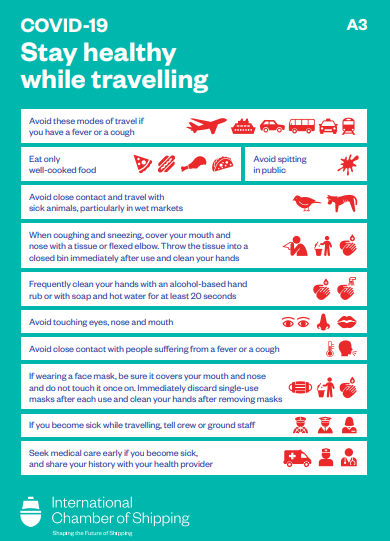The International Chamber of Shipping, ICS has launched a new COVID19 guidelines as latest reports indicate that seafarers are being denied medical attention by port authorities in some cases.
What is it?
The ICS informed this medical treatment denial instance through an updated health guidance for the global shipping industry. The new report seeks to ensure ship operators and crew can safely deal with seafarers struggling with medical conditions amid COVID-19 pandemic.
Why is this needed?
Since the outbreak of the virus, Covid-19 related restrictions and the drastic reduction of air traffic have prevented over 200,000 seafarers from routine changeovers. Spending an extended period onboard, these seafarers are at risk from adverse health effects, including fatigue and mental health issues.
In many cases, seafarers suffering non-COVID related medical conditions are being refused entry to port or denied medical evacuation for over 4 days, ICS reports.
This guidance should give confidence to national governments that crew changes can and must be carried out. Especially when there are critically ill crew members on board. We’re receiving alarming reports of seafarers who are suffering from serious medical injury such as a stroke, be denied medical evacuation for over 4 days. This is simply not acceptable, Guy Platten, Secretary General of the International Chamber of Shipping said.
The guidance builds on the previous guidance issued in March, providing comprehensive recommendations on safe port entry, shipboard measures to address risks associated with COVID-19 and managing other medical issues during COVID-19, including medical assistance to seafarers in ports.
Guidance Reassure of Crew Change Safety
- The new guidance should serve as a reassurance to governments and port authorities that it is fully possible to conduct crew changes in a safe and effective manner.
- Urgent action is now required to ensure that no other seafarers are subjected to prolonged period without medical assistance if they need it.
Port Entry Restrictions
According to the IHR (and other international regulations), state parties shall not refuse to grant ‘free pratique’ (permission to enter a port, embark or disembark, or discharge or load cargo or stores) for public health reasons.
Nevertheless, many governments have introduced national and local restrictions, including:
- Delayed port clearance;
- Prevention of crew (or passengers where applicable) from embarking or disembarking (preventing shore leave and crew changes);
- Prevention of discharging or loading of cargo or stores, or taking on fuel, water, food and supplies; and
- Imposition of quarantine or refusal of port entry to ships (in extreme cases).
While such measures can severely disrupt maritime traffic – and may well be in breach of the IHR, the IMO FAL Convention, and other maritime principles regarding the rights and treatment of seafarers (and passengers where applicable) – the reality is that shipping companies may have little choice but to adhere to these national and local restrictions due to the serious concern about COVID-19 and the potential risk to public health.
However, it is critical that port States accept all types of ship for docking and to disembark suspect cases, as it is difficult to treat suspect cases on board and could endanger others.
How To Ensure That Seafarers’ Treatment Isn’t Denied?
ILO and IMO have advised that during the ongoing COVID-19 outbreak, effective protection of the health and safety of seafarers must remain a priority. Under the ILO MLC:
- Flag States must ensure all seafarers on ships flying their flag are covered by adequate measures to protect their health and that they have access to prompt and adequate medical care while working on board; and
- Port States must ensure that any seafarers on board ships in their territory who need immediate medical care are given access to medical facilities on shore. Together with flag States, companies and Masters should co-operate with port State health authorities to ensure that public health measures are completed satisfactorily.
Did you subscribe to our daily newsletter?
It’s Free! Click here to Subscribe!
Source: ICS




















